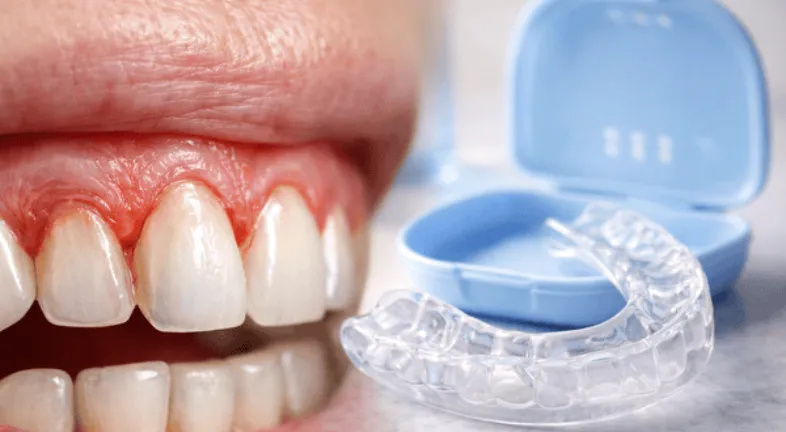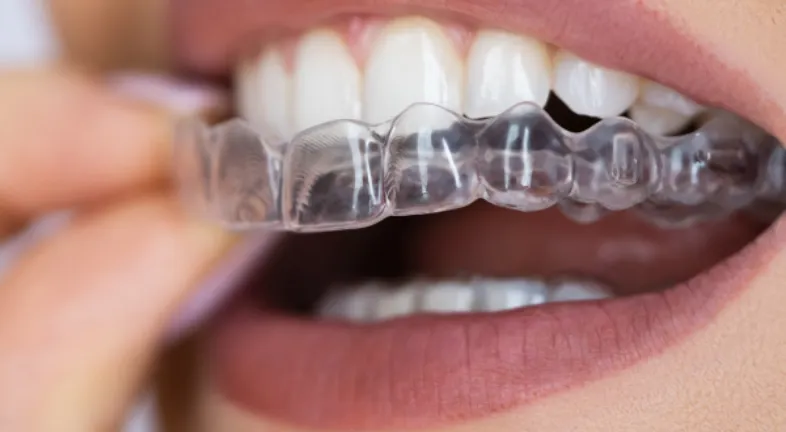
Globally, 90% of people have teeth that are crooked. While it’s a common problem, it’s one that bothers the majority of people.
If you have misaligned teeth, you might feel self-conscious about it. You might even have some associated health problems if they’re bad enough.
Needless to say, your crooked teeth have to go. So you might be researching ways to straighten your teeth. If so, then you’re in the right place.
In this article, we’ll discuss everything you need to know about crooked teeth. This includes causes, consequences, and solutions to fixing them.
You might be wondering: why are you cursed with crooked teeth while others have perfectly straight teeth naturally? Here are a few reasons why.
This is a cause of crooked teeth that you can’t change, as it’s literally in your DNA. For example, if your family has a history of underbites, overbites, or crossbites, then you have a higher chance of having one of those.
You can also be born with a smaller than normal mouth, which causes all sorts of problems. Not only does it cause overcrowding of the teeth, but it can also make your jaws misaligned.
When baby teeth fall out earlier than normal, this may cause future issues for your adult teeth. This is because those teeth will not come in correctly, as they aren’t fully grown yet.
If your parents don’t take good care of teeth and you experience cavities and other trauma, these things can cause your baby teeth to fall out early.
Thumb sucking is a habit formed by people when they’re babies. However, if they don’t grow out of it when their teeth come in, it can cause the teeth to be misaligned.
If you have children of your own, then you need to make sure they break the habit before their teeth grow in. That way, they can avoid the need for serious teeth straightening treatment.
This is another habit that infants have, as it’s associated with suckling. Like with thumb sucking, most children grow out of this habit.
However, for the few teenagers and adults who continue on with tongue thrusting, this will have an impact on both bone and muscle development. As a result, you’ll get crooked teeth.
It may not seem like a huge deal, but mouth breathing can actually heavily influence how your teeth grow.
When you breathe through your mouth instead of your nose, this causes you to hold your jaw in an unnatural way. The result is improper development of the jaw muscles, which will affect how your teeth come in.
If you’ve bumped into something, been in fights, or had a great fall, all of these can cause crooked teeth. Any type of facial trauma will affect your jaw and teeth development, just like many of the above factors.
For example, if you’ve lost a tooth in a fight, this can cause the other teeth to shift and fill in the empty space in your gums.
Allergies and asthma can cause you to breathe through your mouth. If you don’t get your allergies under control and can’t breathe properly, this may lead to the same issues as regular mouth breathing would.
You might think that crooked teeth are just a minor inconvenience and only detrimental in an aesthetic way. However, there are issues you might suffer from if you don’t get them straightened.
Below are a few problems that are associated with misaligned teeth.
This has to do with aesthetics still, but your self-esteem is extremely vital. If you don’t feel confident about yourself, it can really wear on your mental health. And by extension, this can have a negative impact on your relationships with friends, family, and others.
When you can feel confident about your teeth, you can lead a happier life.
If your teeth are crooked enough, they may cause pain and/or discomfort. You might have to hold your jaw a certain way to accommodate them, which can cause further misalignment.
Not only that, but the pain and discomfort can be so bad that it distracts you from normal everyday activities.
For some people, misalignment of the teeth can affect their speech. Not only can this impact your confidence, but it can also make communication more difficult. This can lead to interpersonal issues, whether it’s romantic, familial, or workplace relationships.
If your teeth aren’t aligned correctly, this can cause them to wear down quicker than they should. It may also cause jaw and gum issues. In some cases, it may even cause headaches.
Even if you keep up with regular flossing and brushing, you may still find it difficult to keep up with your oral hygiene. When you miss crucial spots because of crooked teeth, this can lead to poor oral health.
Not only will you suffer from more cavities, but you’ll also develop gum disease. These can lead to infections in your teeth and jawbones.
Perhaps we’ve now convinced you of how important it is to get straight teeth. Not only will it improve your confidence, but also your health.
What are the various ways to fix crooked teeth? Find out by reading on.

Metal bracket braces are the oldest type around, and they’re pretty simple.
Individual metal brackets are attached to each tooth and connected with a thin metal wire. It’s held in place with rubber bands around each bracket.
These are cost-effective and usually covered by the NHS. However, treatment typically takes quite a while and can cause some pain and discomfort.

Ceramic braces are basically the same as metal ones, except they’re made with ceramic, of course. This means they blend in more easily with your teeth, as the orthodontist picks a shade that matches your natural teeth.
However, they’ll stain more easily and are more expensive to get. The treatment time will also be longer than with metal braces and it’ll cost more too (the NHS doesn’t cover any teeth-straightening methods besides metal braces).

Lingual braces are metal braces. But instead of the brackets going on the front of your teeth, they go in the back. This makes them very hidden; the only way someone would see them is if you opened up your mouth widely.
These aren’t cheap braces though. They’ll cost the most out of most treatments available.
Another downside is they can only be used for people who don’t have a severe misalignment of their teeth.

Veneers are thin porcelain or composite caps that are adhered to your natural teeth. Not only can this fix crookedness, but it can also help with discoloration and other imperfections in your teeth.
Do note that dental veneers are not a permanent solution. They can last anywhere between 5 to 20 years, depending on the material chosen. When you factor that in and the high cost that comes with veneers, they’re not the best option for everyone.

Clear braces are also known as invisible braces or clear aligners. These are highly personalized, as the aligner trays are based on your dental impressions.
These are much less painful than traditional braces and very inconspicuous. No one can tell you have these aligners in, as they’re completely clear. They’d have to get a really up-close look at your teeth, and even then, they may not even realize you have clear braces on.
What’s also great is you can take them out at any time. It’s recommended you wear them for around 22 hours a day, but you can still take them out to eat and drink, or just get some freedom from the trays for a little bit.
This teeth straightening option is pretty affordable and what’s best is you don’t have to visit an orthodontist’s office at all. For example, if you get at-home clear braces everything is done by post and internet!
Now you know what causes crooked teeth, as well as the consequences and solutions.
While there are many teeth straightening options out there, one of the best options is invisible braces, or clear aligners. Not only is the least painful method, but it’s also the most discreet.
The cost isn’t that bad either, so what do you have to lose? Straighten your teeth in one of the most comfortable, convenient, and affordable ways possible!
Are you interested in teeth straightening with clear aligners? Then fill out a free assessment form now to see if you’re a good candidate for clear aligners or not.
Curated the best for your knowledge
.webp) Cavities: Why Cleaning Your Essix Retainer Is Important
Cavities: Why Cleaning Your Essix Retainer Is ImportantCavities do not usually start with pain; they begin quietly. A thin film of plaque forms, bacteria settle in, and before you realize it, enamel has started to weaken. The risk of cavities often increases when you wear oral appliances like Essix retainers. However, the retainer itself is not the issue; improper maintenance and neglecting cleaning are the main culprits. If you have invested in orthodontic treatment, whether traditional braces or clear aligners, your retainer is what protects that investment. But an unclean one just makes matters worse. So, let’s walk through this guide to understand why cleaning your Essix retainer is important.
Read More Can Mouthguards Cause Gum Recession
Can Mouthguards Cause Gum RecessionMouthguards are usually seen as the “good guys” of dental care. They protect teeth from grinding, cushion heavy bites, and help prevent long-term damage. So when someone notices sore or receding gums while wearing one, confusion sets in fast. Can mouthguards cause gum recession, or is something else going on? The honest answer isn’t a simple yes or no. Gum recession almost never has one single cause. It’s usually the result of pressure, inflammation, habits, and time all working together. Mouthguards can sometimes contribute to irritation, but in many cases, they’re actually helping prevent worse damage. Understanding the difference matters more than blaming the device.
Read More How to Clean Essix Retainers
How to Clean Essix RetainersIf you wear Essix retainers, commonly known as clear retainers, you already know they are both amazing and annoying. Essix retainers are nearly invisible, lightweight, and comfortable. At the same time, they stain easily, hold onto odors, and can appear questionable if not properly cared for. Cleaning Essix retainers sounds simple. Rinse, brush, done. But if you’ve ever pulled yours out of its case and wondered why it smells off or looks slightly yellow, you already know there’s more to it. In this blog, we will guide you through how to clean Essix retainers properly, what to avoid, how often to clean them, and why they change color over time.
Read MoreQuick Links

Heading